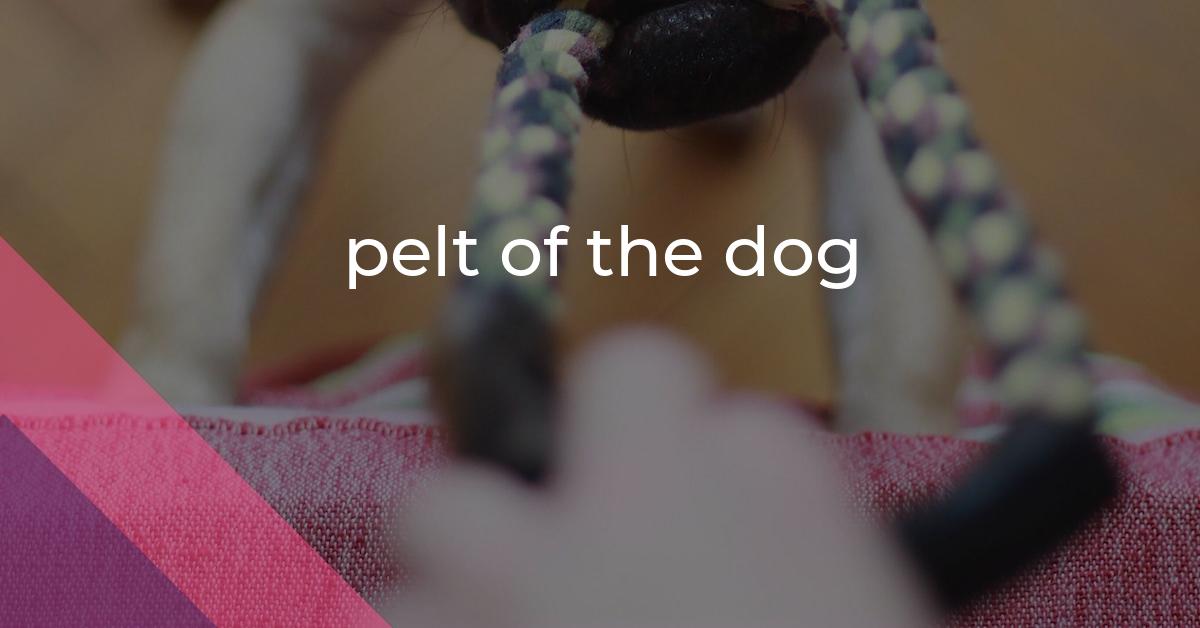pelt of the dog: Idiom Meaning and Origin
What does ‘pelt of the dog’ mean?
The idiom "pelt of the dog" means to treat a hangover or illness by consuming more of the substance that caused it. This practice is believed to provide temporary relief from the symptoms.

Idiom Explorer
An idiom meaning to consume a large quantity of alcohol, usually resulting in getting drunk or excessively intoxicated.
The idiom "put on the dog" means to dress or act in an extremely fancy or extravagant manner, often to show off or impress others.
The idiom "play hob with" means to cause trouble or disruption, often leading to negative consequences or difficulties.
The idiom "piss off" is a vulgar expression meaning to anger or annoy someone. It is considered rude and offensive, and is often used to express strong disapproval or frustration towards someone or something.
The idiom "piss money up the wall" means to waste money in a careless or reckless manner, usually on unnecessary or frivolous things.
The idiom "piss like a racehorse" refers to urinating excessively or with great force. It humorously compares the act of urinating to the strong and frequent urination of a racehorse.
The idiom "piss away" means to waste or squander something, especially money, in a careless or reckless manner.
The idiom "piss more than one drinks" means to complain or express dissatisfaction excessively, often without taking any action to improve the situation.
The idiom "pinch one off" means to defecate or take a quick bathroom break, often used informally.
The idiom "pile up" means to accumulate or gather in large quantities or numbers. It can also refer to a situation where things or problems become overwhelming and difficult to manage. It is often used to describe physical objects or issues that increase or accumulate rapidly.
Enigmatic Revival
The idiom "pelt of the dog" has several variations, including "the hair of the dog" and "the dog's hair." It is primarily used in English-speaking countries, particularly in the United States and the United Kingdom. The idiom refers to the belief that consuming a small amount of alcohol or engaging in a similar activity that caused discomfort or hangover can provide relief or cure the symptoms. This idiom is often mentioned in the context of a hangover remedy, with the belief that consuming a small amount of alcohol the morning after heavy drinking can alleviate the symptoms.
The origin of this idiom can be traced back to the ancient belief that applying a poultice made from the hair or pelt of the animal that caused a wound could provide a remedy or cure. This belief, known as the hair of the dog cure, has its roots in ancient folk medicine. It was believed that by using the hair or pelt of the offending animal, one could transfer its healing properties onto the wound, thus promoting healing or providing relief.
Over time, the idiom "pelt of the dog" evolved to be applied metaphorically to situations beyond physical wounds. It came to represent the idea that engaging in a similar activity or behavior that caused discomfort or harm could somehow alleviate the symptoms or provide relief. In the case of the hangover remedy, it suggests that consuming a small amount of alcohol the morning after heavy drinking can alleviate the symptoms experienced.
The idiom "pelt of the dog" is commonly used in casual conversations and is often associated with humorous or lighthearted references to hangovers or excessive drinking. While there is no scientific evidence to support the effectiveness of this remedy, it continues to be a popular saying, particularly in social settings or discussions about alcohol consumption. The idiom shares a similar meaning with other expressions, such as "hair of the dog," which refers to the same hangover remedy of consuming alcohol to alleviate the symptoms.
The idiom "tie one on" is another expression related to the concept of consuming alcohol as a remedy. It is used to describe getting drunk or heavily intoxicated. The origin of this idiom is unclear, but it is often associated with the act of tying on a drinking vessel, such as a tankard or mug, to signify the start of heavy drinking. This expression highlights the connection between alcohol consumption and the relief or escape it can provide from discomfort or stress.
In contrast, the idioms "knock a dog off a gut wagon" and "gag a dog off a gut wagon" refer to excessive or intense vomiting. These phrases use vivid imagery to convey the severity and force of the act of vomiting. Both idioms suggest that the individual is so sick or intoxicated that they are violently expelling the contents of their stomach. While these expressions are not directly related to the concept of using alcohol to cure a hangover, they both convey the unpleasant and often humorous consequences of excessive drinking.
The idiom "put on the dog" is unrelated to the concept of consuming alcohol as a remedy. Instead, it means to dress or present oneself in a showy, extravagant, or pretentious manner. This expression is often used to describe someone who is putting on airs or trying to impress others with their appearance or behavior. While not directly connected to the other idioms, "put on the dog" shares the theme of appearance and behavior, albeit in a different context.
To summarize, the idiom "pelt of the dog" and its variations, such as "hair of the dog" and "the dog's hair," are expressions used to describe the belief that consuming a small amount of alcohol or engaging in a similar activity can alleviate the symptoms of a discomfort or hangover. These idioms have their roots in ancient folk medicine and have evolved over time to be applied metaphorically to various situations. While there is no scientific evidence to support their effectiveness, these idioms continue to be used in casual conversations and discussions about alcohol consumption. Additionally, related idioms such as "tie one on" and "put on the dog" provide further insight into the connection between alcohol and relief or escape from discomfort or stress. Meanwhile, the vivid imagery of "knock a dog off a gut wagon" and "gag a dog off a gut wagon" highlights the consequences of excessive drinking. These idioms showcase the richness and complexity of language, as well as the cultural and historical factors that shape our everyday expressions.
Example usage
Examples of how the idiom "pelt of the dog" can be used in a sentence:
1. After a night of heavy drinking, he took a sip of whiskey in the morning as a pelt of the dog.
2. She had a splitting headache after the party, but a cup of coffee in the morning was like a pelt of the dog.
3. Despite feeling nauseous, he decided to have a small glass of wine as a pelt of the dog to ease his hangover.
More "Medicine" idioms



